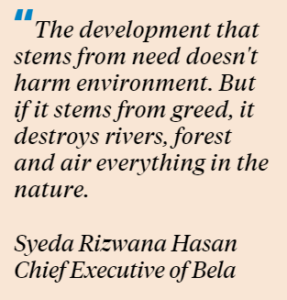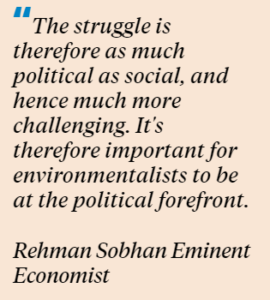Originally posted in The Daily Star on 14 January 2023
Consider running for national polls
Rehman Sobhan urges environmentalists to be at political forefront to better protect nature

Eminent economist Rehman Sobhan yesterday urged environmentalists to consider candidates from their movement for the upcoming general election, which could potentially enable them to execute environmental laws.
The noted public thinker came up with the suggestion in his inaugural speech at an environment conference organised jointly by Bangladesh Poribesh Andolon and Bangladesh Environmental Network at the Central Shaheed Minar in the capital.
“Our environment is under perpetual threat of greedy, powerful and unscrupulous people. Huge amount of wealth in the hand of politically influential people has enabled them to defy environmental laws and threaten the livelihood of working people by polluting rivers, cutting down forest and encroaching waterbodies,” he added.
The struggle is therefore as much political as social, and hence much more challenging. It’s therefore important for environmentalists to be at the political forefront, he said.

“After 20 years, it’s perhaps the time to consider whether the environmental movement in Bangladesh should consider putting up candidates for elections,” he added.
Anu Mohammad, former professor of Jahangirnagar University, said Rampal Coal Power Plant was built risking the world’s largest mangrove forest, the Sundarbans.
The only hilly island of the country Moheskhali has been endangered by building the Matarbari Power Plant, he added.
“There are three layers of power in the country. The first layer consists of giant conglomerates. Second comes the government and finally, the locally grown politically connected groups which act like zamindars (landlord). The third group continues to grab rivers, kill forests, cut hills, and destroy arable lands. The fight to protect environment is the fight against this three,” he said.
Professor MM Akash of the School of Economics at Dhaka University, said, “If you look at Chattogram Hill Tracts, an important biodiversity hotspot of the world, you’ll see forests were razed by rubber industries.”
“Influential people are ripping apart common public goods from Banisanta in Khulna to Mro Para in Bandarban. Together, we can resist those forces,” he said.

Mustafizur Rahman, distinguished fellow of Centre for Policy Dialogue, said the movement should stir policymakers, politicians ahead of the election to commit to protecting the environment.
Syeda Rizwana Hasan, chief executive of Bangladesh Environmental Lawyers Association, said the development that stems from need doesn’t harm environment. But if it stems from greed, it destroys rivers, forest and air.
Professor Nazrul Islam, vice-president of Bapa, also spoke at the event, presided over by Khandakar Bazlur Rahman of Bapa.

